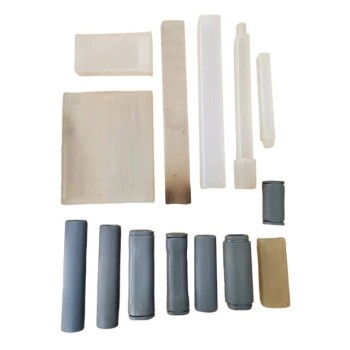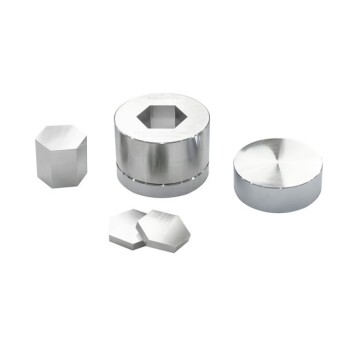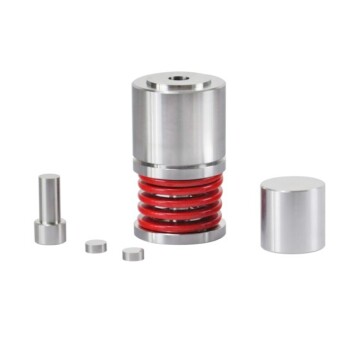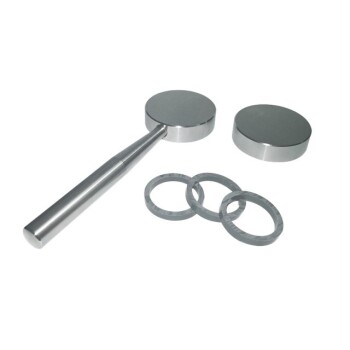In essence, Warm Isostatic Pressing (WIP) can process a broad spectrum of materials, including advanced ceramics, powder metals, composites, plastics, and carbon. The primary factor determining a material's suitability for WIP is not the material itself, but its need for a controlled, elevated temperature to improve its compaction behavior—a need often driven by the binders mixed with the powder.
The choice to use Warm Isostatic Pressing is fundamentally about solving a specific problem: when a material is too brittle or its binder system is ineffective at room temperature, WIP provides the thermal assistance needed to form a dense, uniform "green" part without the high heat of full sintering.
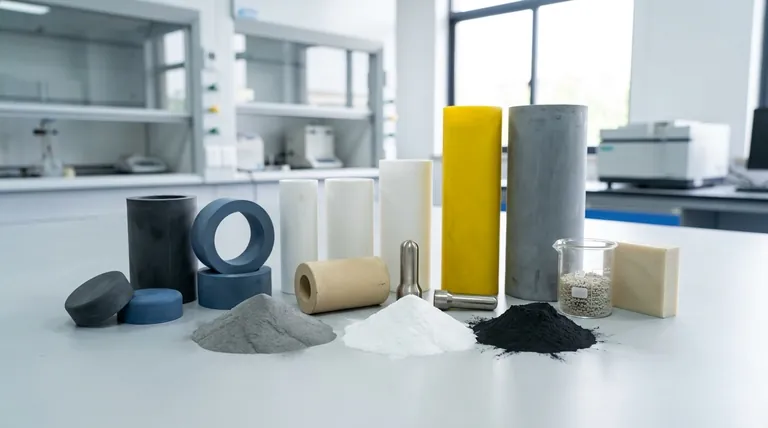
Why Temperature Is the Deciding Factor
The "warm" in WIP refers to processing at temperatures typically between room temperature and 250°C (482°F). This moderate heat is a strategic tool used to manipulate the physical properties of the powder mixture during compaction.
Activating Binders and Plasticizers
Most materials processed via isostatic pressing are powders mixed with a binder, which acts as a temporary glue. WIP's elevated temperature is used to soften these binders, turning them into a more effective lubricant. This allows powder particles to slide past one another and pack into a denser, more uniform arrangement under pressure.
Enhancing Material Formability
Some materials, especially certain polymers or metallic powders, are inherently brittle at room temperature. A moderate increase in temperature can make them more ductile and less prone to cracking during the high-pressure compaction cycle, enabling the formation of more complex shapes.
Overcoming Compaction Challenges
If a material fails to achieve the required density or develops internal cracks when pressed using Cold Isostatic Pressing (CIP), WIP is the logical next step. The added thermal energy helps the material flow and consolidate properly before it is moved to a final sintering or densification stage.
A Closer Look at Compatible Material Families
While theoretically applicable to many powders, WIP is most commonly employed for materials where achieving high "green" density (the density before final sintering) is critical.
Advanced Ceramics
Ceramics like silicon nitride (Si3N4), silicon carbide (SiC), alumina (Al2O3), and boron carbide often rely on polymer binders that require heat to flow properly. WIP ensures these brittle materials form a strong, crack-free green body ready for final sintering.
Powder Metallurgy (Metals and Alloys)
WIP is used to form high-quality preforms from difficult-to-compact metals. This includes superalloys, titanium, tool steels, and refractory metals (like tungsten and molybdenum) that are destined for demanding aerospace or industrial applications.
Polymers and Composites
For engineering plastics and composites, temperature control is paramount. WIP provides the pressure needed for consolidation while keeping the temperature high enough for formability but low enough to prevent melting or degrading the polymer matrix.
Graphite and Carbon
High-purity graphite components used in semiconductor manufacturing or as high-temperature electrodes require maximum uniformity. WIP is used to create highly dense graphite preforms with consistent properties throughout the part.
Understanding the Trade-offs: WIP vs. CIP and HIP
Your choice of process depends entirely on the material's behavior and the desired final properties.
WIP vs. Cold Isostatic Pressing (CIP)
CIP is the simpler, lower-cost process because it operates at ambient temperature. It is the default choice for powders that compact well with room-temperature binders or no binder at all. WIP is the solution when CIP fails to produce a green part with sufficient density and integrity.
WIP vs. Hot Isostatic Pressing (HIP)
This is the most critical distinction. WIP is a forming process used to create a high-quality "green" part. HIP is a final densification process that uses much higher temperatures and pressures to sinter the part and eliminate virtually all internal porosity. A component is often formed using WIP before being densified using HIP.
Making the Right Choice for Your Goal
Selecting the correct isostatic pressing method requires a clear understanding of your material system and your final objective.
- If your primary focus is cost-effective compaction of a simple powder: Start with Cold Isostatic Pressing (CIP), as it is the simplest and most economical method.
- If your primary focus is forming a complex shape or achieving high green density in a material with a temperature-sensitive binder: Use Warm Isostatic Pressing (WIP) to improve formability and prevent defects.
- If your primary focus is achieving 100% theoretical density and superior mechanical properties in a final part: Use Hot Isostatic Pressing (HIP), often as a secondary step after initial forming via CIP or WIP.
Ultimately, choosing the right process is about matching the method's capabilities to your material's specific needs and your application's performance requirements.
Summary Table:
| Material Category | Examples | Key Benefits of WIP |
|---|---|---|
| Advanced Ceramics | Silicon Nitride, Alumina | Improved binder activation, crack-free green bodies |
| Powder Metals | Superalloys, Titanium | Enhanced ductility, high-density preforms |
| Polymers & Composites | Engineering Plastics | Controlled temperature for formability without degradation |
| Graphite & Carbon | High-Purity Graphite | Maximum uniformity and density |
Optimize your material processing with KINTEK's advanced lab press machines! Whether you're working with ceramics, metals, or composites, our automatic lab presses, isostatic presses, and heated lab presses deliver precise temperature control and uniform compaction to achieve superior green density and formability. Serving laboratories in research and industry, we help you overcome brittleness and binder challenges for high-quality results. Contact us today to discuss how our solutions can enhance your lab's efficiency and material performance!
Visual Guide
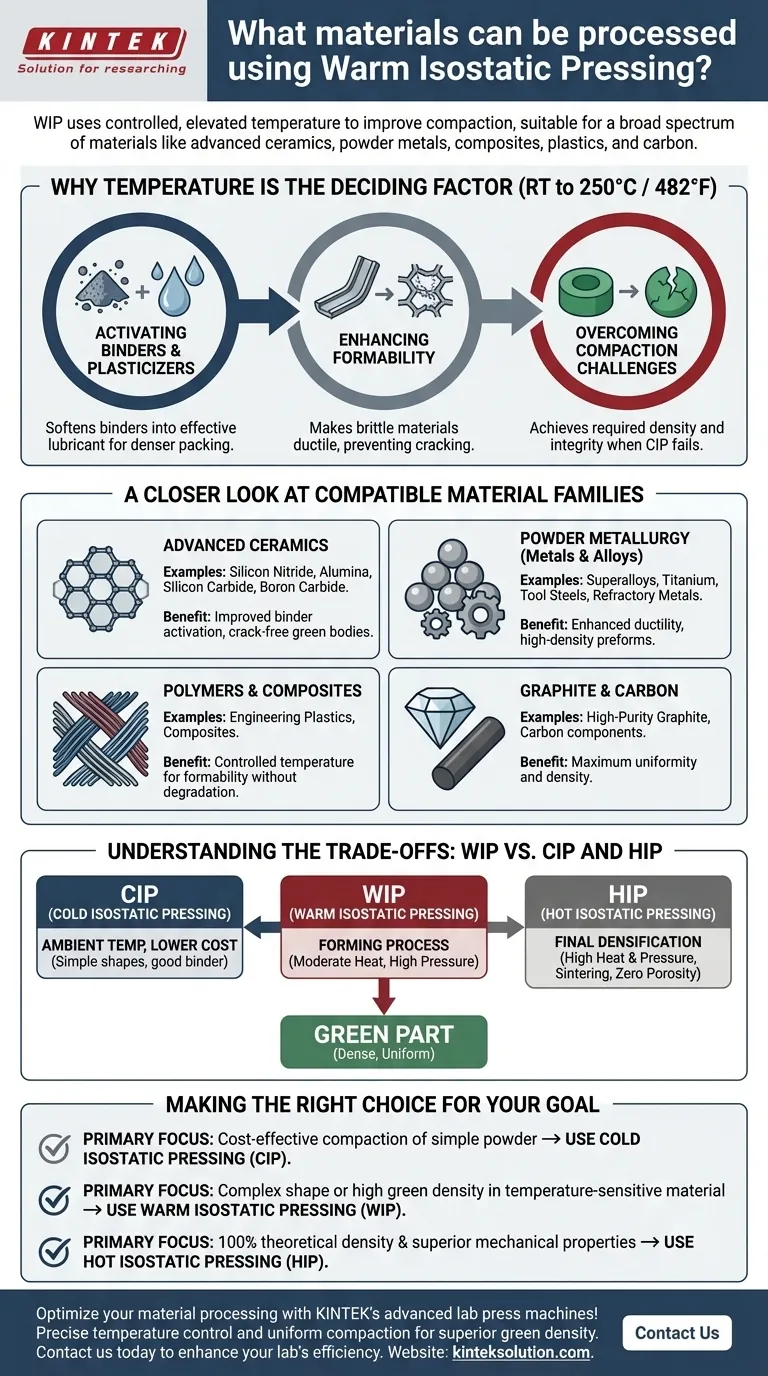
Related Products
- Lab Isostatic Pressing Molds for Isostatic Molding
- Automatic High Temperature Heated Hydraulic Press Machine with Heated Plates for Lab
- Automatic Heated Hydraulic Press Machine with Hot Plates for Laboratory
- Heated Hydraulic Press Machine with Heated Plates for Vacuum Box Laboratory Hot Press
- Lab Polygon Press Mold
People Also Ask
- What is the function of high-strength mold components in cold pressing? Build Stable Silicon Composite Electrodes
- What role does the wall thickness design of an elastic mold play in the isostatic pressing process? Precision Control
- Why are flexible molds essential for the compaction of TiMgSr powders? Achieve Uniform Density in Cold Isostatic Pressing
- What is the purpose of specialized flexible rubber molds in CIP for PiG? Achieve High-Purity Isotropic Compression
- What is the core role of a high-pressure CIP in tungsten-copper composites? Achieve 80% Green Density & Lower Sintering
